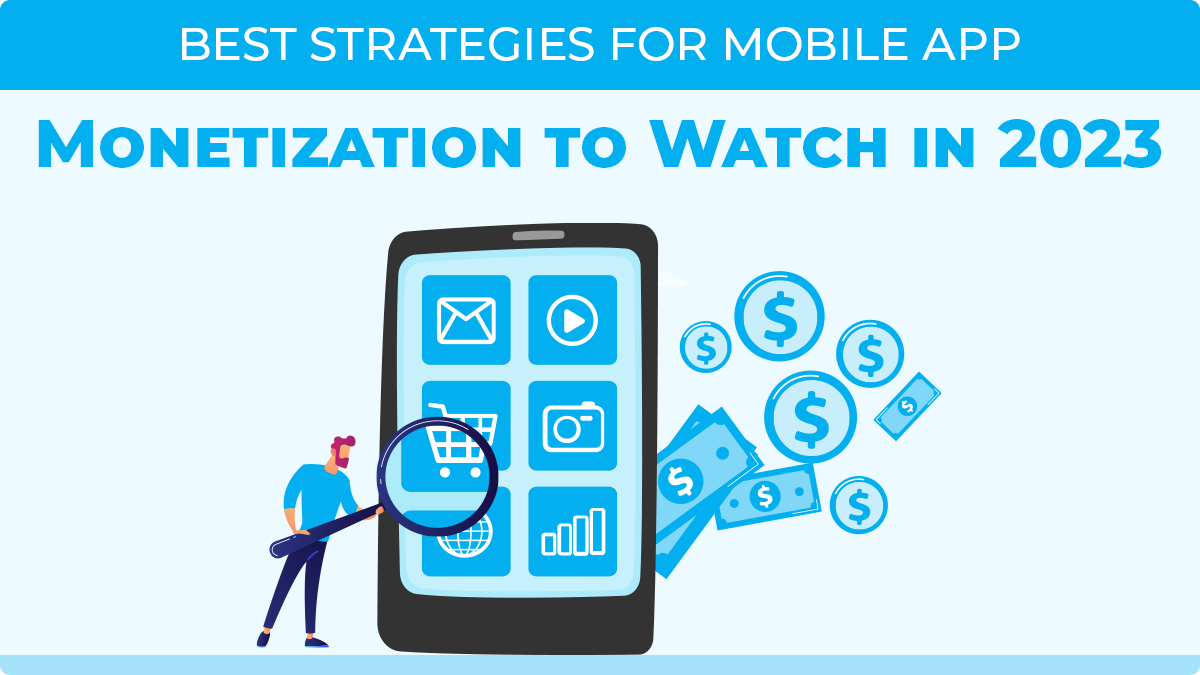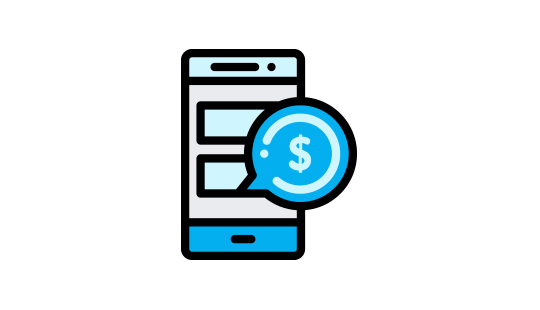Building a mobile app can be a valuable addition to your business, but it may not be enough on its own. The success of your mobile app will depend on several factors, including the quality of the app, the features it offers, the target audience, and the marketing and promotion strategies you employ.
If your goal is to generate revenue through your app then you must consider app monetization. By generating revenue through the app, you can invest in further development and marketing, as well as cover the costs of hosting and maintaining the app. There are numerous approaches to mobile app monetization available.
In this article, we’ll examine a few popular app monetization techniques in more detail and analyze how they may affect user engagement and app growth.

Let us first understand what is app monetization:
App monetization is the process of generating revenue from a mobile application (app) through various methods. When a developer creates a mobile app, they often seek to monetize it to earn revenue for the time, effort, and resources they put into building it.
App monetization is not mandatory. There are many apps that are created for non-commercial or non-profit purposes, and their creators may not be interested in monetizing them. However, if an app is created with the intention of making money, then app monetization becomes a crucial aspect of its development and marketing strategy.
Monetization strategies can include in-app advertising, charging users for access or additional features, selling merchandise or other products through the app, or even using the app as a marketing tool to promote other products or services. The choice of monetization strategy will depend on the goals of the app creator, the target audience, and the nature of the app itself.
App monetization is essential for app owners for several reasons, including:
Generating revenue: The primary benefit of app monetization is that it allows app owners to generate revenue from their app. This revenue can be used to cover the costs of development, marketing, and ongoing maintenance of the app.
Maximizing app’s potential: App monetization can help app owners maximize the potential of their app by offering users more features, better user experience, and ongoing support. By generating revenue, app owners can continue to invest in the app and make it even better.
Providing a sustainable business model: App monetization can provide a sustainable business model for app owners, allowing them to continue offering their app to users without relying on external funding sources.
Encouraging user engagement: Monetization strategies such as in-app purchases can encourage user engagement by offering users the opportunity to access additional content or features within the app. This can increase user retention and drive repeat usage.
Competitive advantage: App monetization can also provide a competitive advantage, as apps that offer a superior user experience and more features are more likely to attract and retain users.
In summary, app monetization is crucial for app owners as it allows them to generate revenue, maximize the potential of their app, provide a sustainable business model, encourage user engagement, and gain a competitive advantage. By implementing effective monetization strategies, app owners can achieve their goals and create a successful app business.
Monetizing your mobile app in 2023 can be done in various ways, including:
In-App Purchases: This involves offering users the option to purchase virtual goods, premium features, or subscription services within the app. This can generate significant revenue if done correctly.
Advertising: Another popular way to monetize your app is through advertising. This could involve displaying banner ads, video ads, or interstitial ads within the app. You can partner with an ad network or use a mediation platform to manage multiple ad networks.
Freemium Model: This involves offering a free version of the app with limited features and encouraging users to upgrade to the premium version for full access. This model can be an effective way to monetize your app while still offering value to users.
Sponsorships and partnerships: You can partner with other businesses and brands to offer sponsored content or special offers to your users. This may be a powerful strategy to bring in money while also benefiting your consumers.
Data Monetization: With users’ data privacy and security being a concern, data monetization is becoming increasingly popular. You can collect user data and sell it to third-party companies to generate revenue.
Crowdfunding: You can use crowdfunding platforms to fund your app’s development and offer early access or other perks to backers. This can be an effective way to raise funds while also building a community of users.
In summary, the key to monetizing your mobile app in 2023 is to focus on offering value to your users while also finding the right monetization strategy that works for your app and audience.
When selecting a monetization strategy for your mobile app, it is essential to consider the following factors:
Type of App: The type of app you have developed will significantly influence your choice of monetization strategy. For example, if your app is a game, in-app purchases, and advertising may be the best strategy, while a productivity app may be better suited for a subscription-based model.
Target Audience: Your app’s target audience will determine their willingness to pay for premium features or subscriptions. It is important to understand their needs, preferences, and behaviors to choose a monetization strategy that will be attractive and effective.
User Experience: The monetization strategy should not compromise the user experience. It is important to strike a balance between monetization and providing a positive user experience to maintain users’ loyalty and trust.
Market Conditions: The market conditions, including competition, pricing, and industry trends, should be considered to choose a strategy that will be competitive and profitable.
App Usage: The frequency and duration of app usage by users will influence the choice of monetization strategy. For example, if users tend to use the app frequently for short periods, advertising may be more effective than a subscription-based model.
Development Costs: The costs associated with implementing and maintaining the monetization strategy should be considered. For example, in-app purchases may require more development work than advertising, which can affect the overall profitability of the app.
Legal and Ethical Considerations: It is important to ensure that the chosen monetization strategy is legal and ethical and does not infringe on users’ privacy or security.
Conclusion
In summary, when selecting a monetization strategy for your mobile app, it is essential to consider the type of app, target audience, user experience, market conditions, app usage, development costs, and legal and ethical considerations. By considering these factors, you can choose the right strategy that will be effective and profitable for your app business.
How Can USS LLC Help You Create and Monetize Your Own Dream App?
Top digital online and mobile app development company USS LLC is renowned for its clearly defined process and step-by-step technique to deliver above and beyond expectations. We are committed to keeping the user experience of your app at the forefront of its systems through the usage of our top-notch development methodologies.
Our clientele includes some of the most well-known international companies in a variety of industry verticals, such as Rx Valet, Shield PBM, Simple Scripts, and Easy Everyday English.
So what are you waiting for? To discuss your next app concept and get started, get in touch with our experts!
